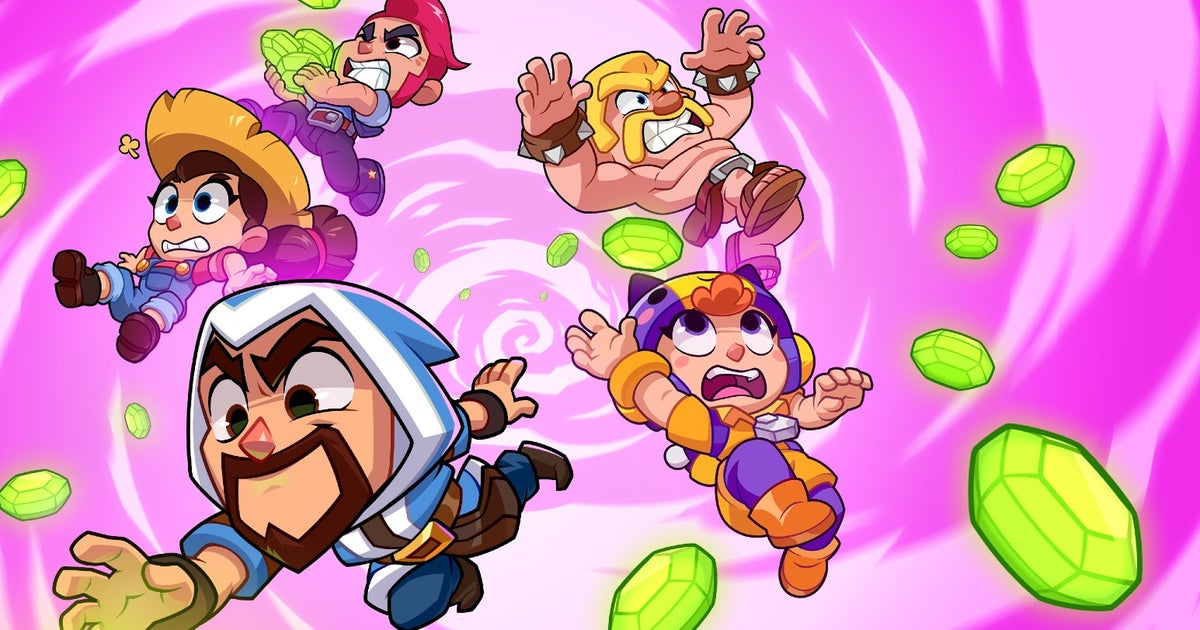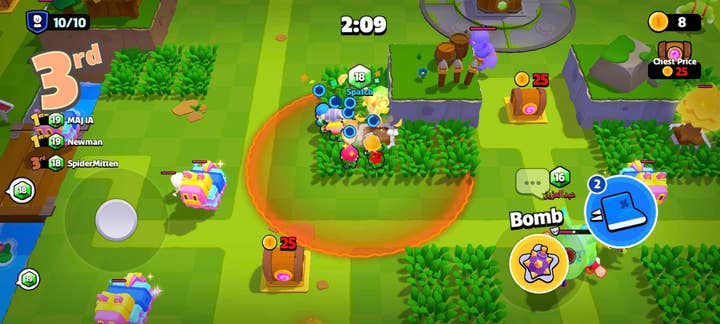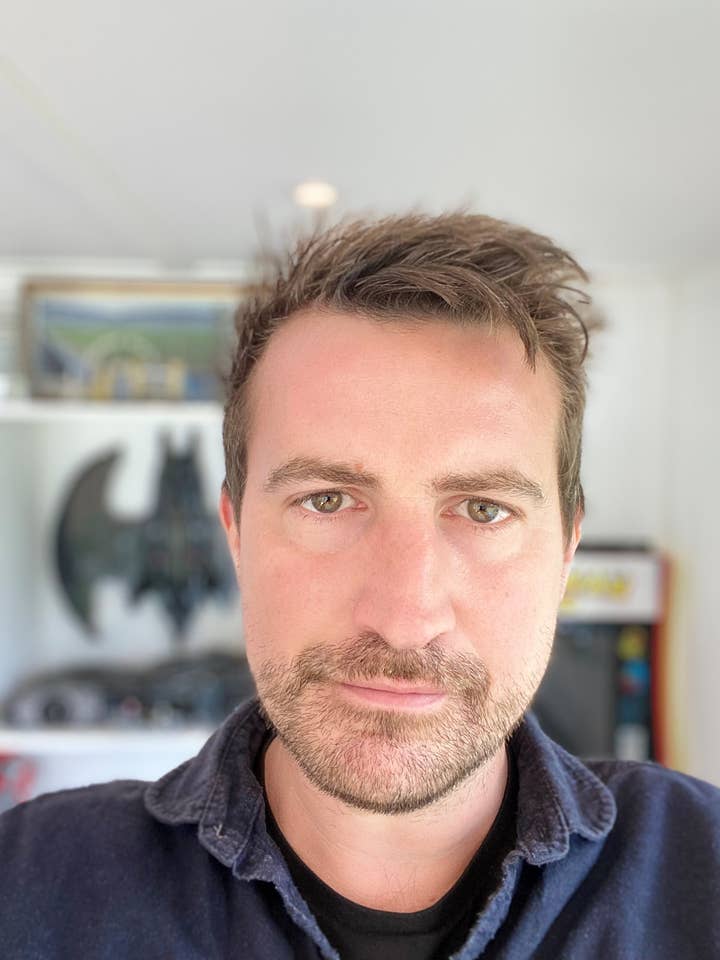
Supercell is one of the most successful developers in mobile gaming, a feat even more impressive when you consider it’s off the back of just five games. On May 29, the Finnish developer launched its sixth title, Squad Busters, and it’s already a smash hit.
The game generated $1.1 million on launch day and quickly passed 30 million downloads, which game lead Eino Joas tells GamesIndustry.biz makes it “by far the biggest launch that we’ve had.” Anecdotally, we also heard that by day two it had already earned enough to recoup the casting costs of its star-studded live action trailer, which featured Chris Hemsworth, Christina Ricci, Ken Jeong and more. While Supercell’s marketing exec Rob Lowe does not confirm this, he does add the game is “quickly getting toward profitability.”
The fact that Squad Busters is only the sixth game to launch globally in Supercell’s 14-year history is significant; famously, the studio has only admitted it frequently kills many of the other games it has worked on, even if they make it to public beta or soft launch in selected markets. A representative for the developer tells us that six titles in public beta or soft launch were scrapped between the 2018 launch of Brawl Stars and last month’s debut for Squad Busters – so why did the latter escape the axe?
“Our bar is very, very high for these global releases,” Joas explains. “All of the other games that we’ve had in soft launch or in various betas, I think they’ve all had something that didn’t click and didn’t work. It’s very tough, that’s the truth of it, and only Squad Busters is one where all the stars aligned. We had a package that we were able to go the full mile with.”
“Our bar is very, very high for these global releases. Only Squad Busters is one where all the stars aligned. We had a package that we were able to go the full mile with”
Eino Joas, Supercell
Lowe adds: “It was something that we didn’t already have, with a huge potential to go very broad. It’s pretty easy to pick up and play. It has characters that appeal to younger and older audiences. The multiplayer aspect of it is fun, but not overly intense. So, it really reminds me of Mario Party, Mario Kart-style games. And then, obviously, that leads you to a certain place in the portfolio where this could be bringing in lots of new users to Supercell.”
Squad Busters is a multiplayer action game in which players guide a group of characters (a squad, if you will) as they automatically defeat enemies and collect treasure, attempting to gain more points than the other players in that match. The characters available all hail from past Supercell titles: the chicken from Hay Day, the barbarian from Clash of Clans, and so on.
It’s rare to see a mobile title that dips into a developer’s portfolio like this, but former Nintendo marketing exec Lowe says this is born out of the success Supercell has seen, especially since the launch of Clash twelve years ago.
“Having a mobile game that has lasted that long is incredible in a market where things change very fast,” he says. “I think the Barbarian of Clash is one of the only iconic characters that has come out of and is unique to a mobile game, probably ever. You could argue that there are some iconic characters from Candy Crush and other games, but when you see that character, you know straight away who it is, or at least you have an inkling that it’s from a game on mobile.
“When you add in characters like Shelly and Colt from Brawl Stars, who have their own following with a whole new generation of kids… We’re very lucky to have that springboard when a lot of other mobile studios don’t. So, of course, we’re going to use it,” he laughs. “So, yeah, Squad Busters is our Smash Bros.”

Smash Bros, of course, has long since expanded beyond Nintendo’s own IP with the likes of Sonic, Pac-Man, and Metal Gear’s Solid Snake also available to play in later entries of that series. Given the plethora of brand collaborations in live service games, especially on mobile – including Supercell’s own Brawl Stars/Godzilla partnership and the more recent Clash of Clans/Erling Haaland campaign – can we expect to see non-Supercell IP joining the squads?
“That’s something we’re certainly looking at,” says Lowe. “There’s loads more stuff in the Supercell cupboard for us to go and root around with, but there are also a ton of other third-party IPs that we’re starting to look at as well.”
He continues: “I think it’s really important to think about what feels right for the game. Squad Busters has this very chibi anime style to it. It takes our toon-style characters, and then remoulds them into a slightly different form, so we want to be consistent with that. Also, anything that would come in has to have that kind of style and feel to it.
“Our art director on the game is very focused on how it feels, and that it feels like it fits into the universe, which is absolutely the right way of thinking about it. So it’s not like we’re going to suddenly stick in a random IP and completely change the nature of those characters. It needs to work within the game. But, yeah, I’m sure we’ll see more on that coming soon.”
Squad Busters is not just a significant release for Supercell; in a recent episode of the GI Microcast, MobileGamer.biz editor Neil Long said the studio’s success and standing makes this game a tentpole release in that market, likening it to “the GTA 6 of the mobile world.” It speaks to not only the prestige of Supercell’s games, but also the lack of major launches in mobile compared to what you see in console and PC. So why the disparity between the two markets?

“We’re lucky to have that springboard when a lot of other mobile studios don’t. So, of course, we’re going to use it. Squad Busters is our Smash Bros”
Rob Lowe, Supercell
“I think part of it is down to the nature of how mobile games are developed as live-service games,” says Lowe. “We took a choice with Squad to have a short soft-launch window [starting in April 2024]; in an ideal world, it probably would have been a bit longer. But what that did enable us to do is to have a big bang launch. We announced the soft launch and then very quickly afterwards announced the global launch. We’re able to point all of the artillery, both ours and our partners like Apple and Google, towards that launch. That’s much more typical of a AAA game launch, and is atypical of a mobile launch.”
It’s a stark contrast to many mobile titles, which tend to spend months, if not years, soft-launched in select markets as the developer gets a feel for how players engage with it. Global launches tend to follow later as the user acquisition builds up and the studio has a better understanding of which audiences will enjoy the game the most. And Lowe emphasises that both approaches work.
“We’ve done loads of analysis. We knew when we did this that it would come in at a huge level, get a lot of awareness, drop down a bit, and then come back up. Or you can start from nothing and build up over a long period of time. Both of them end up in roughly the same place. So, you have a bit of a choice there on how you do it.”
He adds that, just as there aren’t many mobile developers that can draw on multiple IP in the way Supercell does with Squad Busters, there aren’t as many studios in that market that have “such a degree of affection and love as Supercell does.”
“I’m not sure every mobile company could have done a launch like this, but I think we felt reasonably confident going into it, because we knew there was that anticipation.”

To the broader point about how mobile games tend to release with less fanfare than PC and console titles, Lowe believes that this should not be the case.
“Mobile games shouldn’t be dismissed from the overall gaming discussion that happens,” he says. “It reminds me of being back at Nintendo fifteen years ago. It’s the same conversation, where originally all video games were pigeonholed with a bit of stigma attached to them. I think that’s grown a lot now and people see, as you see with The Last of Us and Fallout and the TV shows, plus the movies breaking out into the mainstream audience now, I think there’s no reason why mobile games shouldn’t be in the same discussion as some of those video games on console and PC at the same time.
“And I sincerely hope that that will also change, because we’ve got the numbers, but it’s still thought to be almost like – you ask someone, ‘Do you play video games?’ They say, ‘No.’ You say, ‘Do you play Candy Crush?’ ‘Oh yeah, I play Candy Crush.’ ‘Do you play Words with Friends?’ ‘Yeah, I play Words with Friends.’ ‘Do you play Clash of Clans?’ ‘Oh yeah, I play that.’ Like, you realise that’s a video game? So, I think that needs to change, and hopefully a lot of the work we do, that’s again one of the reasons why we try and shock people by bringing these squads of characters together with our marketing, is people are like, ‘I wouldn’t expect to see all of them in an ad for a video game.'”
“It used to be that as long as you brought a quality product, the audience would find it, but now you need the whole package to have a chance”
Eino Joas, Supercell
All this speaks to the wider challenges mobile developers face. Just as in the console and PC space, there is a deluge of new releases all the time, making discoverability much more difficult – fortunately, Lowe says, both Apple and Google “have been great partners” in helping Supercell to overcome this.
“[Discoverability] often requires a reasonably substantial amount of investment,” he says. “You can have a good feeling around whether your game is good or not, and you can obviously test it in soft launch, and you can look at your Day One, your Day Seven, your Day 30 metrics, but until you go global with a mass audience, you never quite know what’s going to happen.
“We’re in a fortunate position at Supercell to have these five successful hit titles already out, which gives us a degree of risk-taking ability. And I think that’s something that a lot of mobile games companies have a challenge with, which is that they’re unable to take too much risk, particularly on the marketing side of things.”
Joas adds that Supercell has another ace up its sleeve: “We have our huge Creator community of content creators who have been creating content for our games ecosystem for up to twelve years in some cases. The Creator programme is something that we started some years ago, and it’s like a wrapper for us to keep these creators creating more content for our games, and also feature our upcoming games. So, we are able to shortcut some of the difficulties in discoverability through this layer, and just have a lot of reach overall, just through our own channels.
“I think one more thing is it’s [not just] the number of games, it’s also the quality of games. There are a lot more high-quality games being released than ever at the moment. In that sense, it’s a bit of a revolution out there where it’s just very, very difficult to stand out, even if you have a quality product. It used to be that as long as you brought a quality product, the audience would find it, and you would win, but now, you need so much more. You need the whole package to have a chance.”
Squad Busters initial success shows that Supercell’s bet on the party action game over the six other games it killed is already paying off. Does this add pressure to the other teams within the studio working on future games?
“Overall, the expectation for any game team at Supercell is that none of them set out to make the sixth smallest game,” Joas laughs. “We’re basically setting our expectations on the level of our previous successes, and the bar is as high as it ever was. We’ve been very positive with the surprise, but of course, being northern Europeans and having an Englishman on the team, we still have this healthy caution where it’s still the early days.
“The initial [response] has been absolutely fantastic. It’s been a real delight to launch this. But then, we’ll keep tinkering at it, and keep adding content, and keep looking at it to make it the best it can be as we go forward as well.”